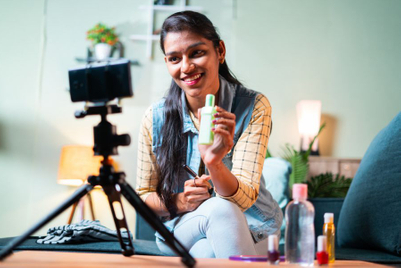
It was a Saturday morning, and I was sipping coffee at my usual café in Serangoon North when I overheard two parents lamenting their children’s career aspirations.
“She wants to be a YouTuber,” one said with a sigh. “Says she can make more money than her marketing degree would pay.”
The other nodded. “My son spends hours making TikToks. When I ask about his future, he calls himself a ‘content creator.’”
This exchange stuck with me. I grew up in a traditional family where success meant a stable career in law, medicine, engineering, or finance. But in 2025, is that still the gold standard? And more urgently: Can a career in content creation offer real financial security, especially in markets like Singapore?
In the wake of the pandemic, digital acceleration shifted consumer behaviour permanently online—and along with it, new monetisation models emerged. What was once a side hustle has become a legitimate income stream for a growing cohort of young Singaporeans. According to a 2024 survey by the Infocomm Media Development Authority (IMDA), around 8% of Singaporeans aged 18 to 35 identify content creation as either their primary income source or career goal.
Yet numbers only scratch the surface. Beyond the filtered reels and viral moments lies a far more complex—and often misunderstood—reality.
A content creator isn’t simply someone posting casually on social media. The serious ones produce consistent, high-quality videos, images, podcasts or articles, with the clear intention of building a community and commercialising it. Singaporean names like JianHao Tan, Naomi Neo and Melissa C. Koh have successfully scaled their platforms into business empires, leveraging brand deals, merchandising, and even agency spin-offs.
But these examples remain exceptions. A more common experience involves creators earning enough to scrape by—typically between S$2,500 and S$6,000 per month, roughly equivalent to a fresh graduate’s starting pay. The difference? Most creators don’t receive Central Provident Fund (CPF) contributions, paid leave or employer-sponsored health insurance. As content creator Ryan Sylvia revealed in a recent podcast, even with over half a million subscribers, an algorithm change once cut her income by nearly 40%.
This is compounded by the limitations of Singapore’s small market. With a population under six million, creators quickly hit a local ceiling—forcing them to either compete for scarce domestic ad budgets or expand regionally, both of which come with their own challenges.
Still, the commercial opportunity is undeniable. Brands across Southeast Asia—from Charles & Keith and OSIM to government statutory boards—have shifted serious marketing spend towards influencer partnerships. Industry data suggests that influencer marketing now takes up around 25% of consumer brand budgets, compared to less than 5% a decade ago. This growth has largely come at the expense of traditional media, which has seen a double-digit dip in spend allocation.
What’s driving this shift?
Trust, relatability, and algorithmic reach. Audiences today respond to authenticity more than polish. Creator-led content not only outperforms branded content in terms of engagement, it often delivers higher conversion rates. But this effectiveness has also raised expectations. Brands now demand creators who are not just charismatic, but professional who can deliver metrics, negotiate contracts, and operate with strategic foresight. Many aspiring creators simply aren’t prepared for the business side of the job.
Still, it’s not all doom and hustle. We’ve seen creators who treat their platforms as launchpads, not endpoints. Miss Tam Chiak, a beloved local food creator, has expanded into food tours and consultancy. Aiken Chia parlayed his YouTube popularity into a production house, Every Good Endeavour, now employing other creatives. These are examples of creators thinking long-term, diversifying income, and building sustainable models.
That said, creators need to compensate for the lack of traditional safeguards. There’s no employer matching your retirement fund, so financial literacy is critical. Benjamin Kheng has openly discussed how he sets aside a portion of his variable income for future healthcare and CPF-equivalent savings. It’s not glamorous, but it’s necessary.
Learning adjacent skills—video editing, copywriting, graphic design, public speaking—also helps creators future-proof their careers. These capabilities are transferable, especially if social media platforms evolve or monetisation models shift.
So is content creation a viable career? Yes—but only for those willing to treat it like a business. It demands strategic thinking, emotional resilience, and relentless adaptability. For every JianHao driving a luxury car, there are thousands struggling to get noticed. Like any entrepreneurial path, it comes with high risks—and potentially high rewards.
Parents might consider engaging with their children’s ambitions instead of dismissing them. What seems like play could evolve into a meaningful profession. And as brands continue to invest in creator-led campaigns, we may well be watching the early architects of Asia’s next creative economy.
Hazel Yap is a co-founder and COO of Serious Media.



.jpg&h=334&w=500&q=100&v=20250320&c=1)
.jpg&h=334&w=500&q=100&v=20250320&c=1)

.jpg&h=334&w=500&q=100&v=20250320&c=1)
.png&h=334&w=500&q=100&v=20250320&c=1)
.png&h=334&w=500&q=100&v=20250320&c=1)




.jpg&h=268&w=401&q=100&v=20250320&c=1)


.jpg&h=268&w=401&q=100&v=20250320&c=1)



.png&h=268&w=401&q=100&v=20250320&c=1)